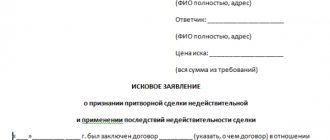Gifting various property to relatives or third parties is a very common occurrence. This procedure is characterized by simplicity of conclusion and a reliable guarantee that it is difficult to terminate. How to challenge the donation of an apartment in this case?
Various circumstances arise in people's lives that will lead to a revision of a previously made decision. Is it possible to cancel a deed of gift after its conclusion and registration? Current legislation allows this possibility.
However, a number of requirements must be strictly observed. The article will help you understand all the intricacies of the legal relationship under consideration. Tell the reader how all actions should be carried out.
What is a deed of gift: general provisions for donating real estate
A deed of gift for an apartment is a unilateral legal agreement between two citizens. In accordance with which one of them undertakes to donate movable or immovable property to the other free of charge.
The main classifying feature of the transaction is gratuitousness - the person receiving the gift is not obliged to perform any actions in return. When this fact is present, the transaction will not be considered a gift.
Often property is given as a gift to avoid having to make a will. If you conduct a comparative analysis of whether a deed of gift or a will is better, then the scales will tip in favor of the gift.
Here are some reasons in favor of the first obligation:
- can be drawn up in simple written form without notarization;
- in case of divorce, everything that was given is not divided;
- in case of death is not included in the marital share;
- more difficult to challenge in court;
- the donor can live in the donated property until his death;
- low financial costs, no need to pay personal income tax;
- ownership begins from the moment of state registration;
You can give absolutely anything that belongs to a person. The main thing is to get the deal done correctly.
Imaginary deed of gift
In this case, the gift agreement covers another transaction. Most often, a contract for the sale, rental or exchange of real estate. In reality, the parties transfer money to each other on a receipt, keys to a house (apartment), actually exchange real estate or enter into an agreement on lifelong maintenance with a dependent. However, on paper they sign an agreement on the donation of housing and send these documents to Rosreestr for inclusion in the Unified State Register of Real Estate. Subsequently, the counterparty, dissatisfied with the agreement (having not received money, services or property), files an application with the court and demands that the agreement be declared invalid. And if his arguments are supported by evidence (receipt, acceptance certificate, real contract, receipts for payment of taxes and utilities, and so on), then the court recognizes the donation as invalid (Decision of the Sovetsky District Court of the city of Ufa of the Republic of Bashkortostan in case No. 2-307/ 2016 dated 04/11/2016).
What are the grounds for challenging a gift agreement?
How to invalidate a deed of gift? The legislation provides for the possibility of carrying out this procedure.
In judicial practice, there are often challenges to the gift agreement . Why does this happen rarely? Mostly, the legal relationship is between close relatives who adhere to their obligations.
The main reasons for termination are:
- Recognizing it as invalid on the grounds that the requirements for its conclusion were not met.
- At the initiative of one of the parties, most often the donor or third parties who believe that their rights have been violated.
In the first option, this occurs on the basis that the transaction was completed in violation of the law. In the second case, due to personal initiative, third parties or parties to the agreement believe that their rights have been infringed or violated.
Is it possible to challenge a deed of gift for a house and land?
Often, house construction with a plot of land is given as a gift. Each of these objects has its own title documents. How to invalidate the gift agreement in this case?
The reasons for canceling the obligation are:
- the gift was made by a minor or incapacitated person;
- the home ownership and land were donated to an employee of the medical or medical institution where the donor was located;
- when the person depended on the donee;
- one of the participants is an employee of government agencies, and the gift was gratitude for the action performed by the official;
- in favor of an employee of the Central Bank of the Russian Federation.
If at least one of these conditions is present, you can file a claim in court to challenge the concluded deal. This can be either the person who gave the gift or his relatives claiming the property.
After the death of the donor
In this situation, a number of persons often appear who will try not only to divide the inheritance mass on grounds beneficial to themselves, but also to terminate previously concluded legal relations.
Therefore, the case when citizens try to challenge a deed of gift for an apartment after the death of the donor is no exception.
Here the following grounds must be met:
- lack of rights to the donated property;
- there is no notarized consent of the second spouse;
- the person knew about the lack of consent of the other spouse;
- the agreement was concluded fraudulently;
- other goals were pursued, such as registration of a different type of legal relationship (purchase and sale);
- the process of transfer of real estate occurred through misleading the donor;
- the owner of the apartment was declared incompetent at the time of the transaction.
In practice, most often all these conditions are identified at the stage of concluding an obligation. But sometimes even control by representatives of government agencies may not immediately detect violations.
Reasons for challenging a deed of gift in 2020
Challenging a gift agreement in 2020 is a rather complex and confusing legal phenomenon. Thus, according to the standards established by the current Russian legislation, the deed of gift is subject to cancellation if the following grounds exist:
- the insignificance of the registration of a transaction for the gratuitous transfer of a gift;
- invalidation of the contract;
- cancellation of the agreement.
At the same time, the following may require challenging the donation through the court:
- donee;
- donor;
- mortgagees as well as creditors;
- heirs of the donor by law and will (this opportunity appears to them only after the death of the donor).
Also, we note that it is possible to challenge offenses committed during the conclusion of the transaction in question only in court! The proceedings themselves will be started only if there are grounds for this in the claim, which are provided for by legal norms.
Example from legal practice
Citizen M. donated an apartment to her friend N. as a gift, but six months after the transaction was concluded, a quarrel occurred between the friends and M. filed an application with the court demanding that the donation be challenged and the deed of gift declared invalid. As a result of the consideration of the case, the court found that there were no legal grounds for satisfying the claim and M. herself could not present any grounds or evidence of violation of the law when drawing up and executing the gift agreement. Therefore, M.’s claim was denied.
EVERYONE NEEDS TO KNOW THIS:
Gift agreement between spouses
In addition, in order to challenge a deed of gift, the legislator has determined certain time periods of limitation, ranging from 1 year to 3 years . This time is quite enough to protect interested parties and assert their rights.
Categories of persons who can challenge a deed of gift
As mentioned above, there are many who want to challenge a deed of gift, even during a person’s lifetime.
This process can be initiated by the following persons:
- Directly by the donor himself.
- Third parties (relatives) claiming the donated property for one reason or another.
- Creditors of the debtor.
In the second case, the relatives of the testator, as a rule, will seek to have the transaction declared invalid.
In accordance with Art. 575 of the Civil Code of the Russian Federation, a gift agreement is declared invalid under the following conditions:
- if they are minors (when the value of the gift exceeds 3 thousand rubles);
- incapacitated persons;
- if given to employees of medical, educational, social institutions in which the donor was undergoing treatment or depended on the provision of certain actions from the specified category of persons;
- civil servants, military personnel in connection with their official position and status;
- commercial organizations.
Having filed a claim in accordance with the requirements of Art. 131 of the Code of Civil Procedure of the Russian Federation, citizens who want to challenge the deed of gift go to court. Next comes the trial. Then, if there are grounds, a decision is made to recognize the gift agreement as void.
Court decision declaring the gift agreement invalid
When making their decision to recognize a deed of gift as invalid, the courts, of course, proceed from the circumstances of a particular case, checking the presence of the grounds listed by the legislator that determine the illegality of concluding a deed of gift, such as:
- Lack of indication in the content of the apartment donation agreement of characteristics and conditions.
- The death of the donor before the mandatory re-registration of ownership of real estate is carried out, because only after such registration through the MFC or Rosreestr, the donee becomes the legal owner of the donated property.
- When registering the donation, the consent of the donor’s spouse for the transaction was not obtained, while the freely transferred living space is part of the jointly acquired property (Article 35 of the Family Code of the Russian Federation).
Example
Citizen O. filed a claim with the court to declare the gift of the apartment, which was issued between citizen R. and citizen M (the applicant’s ex-wife), invalid. At the same time, the plaintiff indicated that at the time of the donation transaction, the apartment was part of jointly acquired property, which had not yet been divided.
EVERYONE NEEDS TO KNOW THIS:
Donee under a gift agreement - rights and obligations
Thus, during the trial, the court found that at the time of signing the gift agreement, the parties were informed about the consequences of the transaction without the participation of the husband, but decided to carry it out anyway. As a result, the court upheld the claim, seized the apartment from the third party’s ownership and decided to return the money to the defendant to the second party of the donation.
In what cases can a contract be terminated?
It often happens that time passes and one of the parties may change their mind and cancel their decision. We must also take into account unforeseen circumstances that will influence the decision.
There are the following ways to terminate an obligation:
- Cancel a deed of gift unilaterally at the initiative of one of the parties.
- By agreement of both participants.
It is optimal when the agreement is terminated by agreement of the parties to the legal relationship. This quickly solves the problem and allows you to avoid unnecessary expenses.
Unilaterally
In this situation, both one participant in the legal relationship and the other can terminate the gift agreement. At the same time, the legislator provided a number of conditions.
The donor can do this:
- when criminal actions recorded by law enforcement agencies were committed against him or his relatives by the donee;
- the person who received the gift misuses or treats the property inappropriately, worsening its condition;
- the terms of the agreement were violated;
- the death of the person to whom the property was gifted has occurred.
People who have received a gift often neglect, after receiving the gift, a good relationship with the former owner of the apartment or house, committing inappropriate acts against him or his relatives.
Terminating a transaction at the initiative of the donee means abandoning it.
When it has already been concluded, it can be terminated in the following cases:
- the fact of transfer of property was not made;
- the donor’s obligations were not met;
- there is no desire to accept property as a gift;
- no registration.
Note! Most often, the initiators of the termination of the transaction are the donors of the property. The court must provide reasoned evidence to substantiate its claims.
By agreement of the parties
There is a pre-trial procedure for terminating the agreement of Part 1 of Art. 450 Civil Code of the Russian Federation. The parties must first consider this option for resolving any disputes or disagreements that have arisen.
The first step is to discuss the procedure together. In accordance with clause 4. Art. 453 of the Civil Code of the Russian Federation, participants in a legal relationship do not have the right to demand compensation for actions or obligations that were committed by the donee during the ownership of the property. The gift is returned to the donor in the same condition as it was given.
As soon as people have reached an agreement, you need to receive a sample agreement on termination of the apartment donation agreement (download for free), which you can fill out yourself. Its signing cancels the previously concluded agreement.
It must reflect:
- where compiled, date and locality;
- installation and passport data of the parties;
- details of a previously concluded agreement;
- complete property data;
- the expenses of the parties upon termination of the deed of gift are indicated.
Typically, the parties to the agreement share the costs equally. If they are unequal, this must be indicated in the document being drawn up so that there are no contradictions in the future.
Grounds for invalidating an agreement
The grounds for loss of validity of a deed of gift depend on the type of invalidity. The conditions for the nullity of a deed of gift are the same as for other agreements:
- pretense or imaginary agreement;
- drawing up an agreement in violation of the law;
- execution of an agreement for illegal purposes;
- incapacity of one of the parties.
Contestability is the ability to “nullify” a transaction through the court. The conditions for contestability are as follows:
- deception;
- delusion;
- violence or threat;
- difficult circumstances.
Contestability primarily concerns the parties to the agreement themselves. If there is coercion, then the counterparties can “nullify” the agreement.
Violations of the law
Direct violations of the law are punishable by the nullity of the deed of gift. For example, this could be a donation of property that has been withdrawn from circulation (weapons, drugs).
This is important to know: Features of termination of a gift agreement
The points enshrined in Article 575 of the Civil Code of the Russian Federation also fall under nullity. Among them:
- donation on behalf of minors;
- donation between commercial organizations;
- making a gift to a government official.
If the amount of the gift is more than 3 thousand rubles, then the listed points prohibit the deed of gift. Since the transaction is made in violation of the law, it will be considered void.
Fictitious and imaginary donation
Pretense and imaginaryness are two conditions that give rise to the insignificance of a deed of gift. An imaginary donation is the conclusion of an agreement without transfer of property. The meaning of an imaginary agreement is to create the appearance of a transaction being formalized without any legal consequences for the parties. Using these tactics, many owners try to evade taxes and penalties from creditors.
Imprisonment by an incapacitated person
Insignificance can also arise due to the participation of incapacitated persons in the transaction. The law classifies the following categories as incapacitated persons:
- persons suffering from alcoholism;
- persons suffering from drug addiction;
- persons suffering from mental disorders.
In addition, Article 575 of the Civil Code of the Russian Federation lists additional categories that can also be called incompetent for donation:
- minors;
- commercial organizations;
- civil servants.
The deed of gift implies adequacy and the ability to manage one’s own actions. Giving means being aware of what you are doing. Therefore, persons who cannot control their own actions do not have the right to participate in the gift.
Gift made under the influence of error
Misconception is a person’s lack of awareness regarding the facts of a gift. The counterparty simply does not know the factors that can greatly affect his decision. Examples:
- the donor may undervalue his property;
- the recipient may be mistaken about the quality of the gift;
- the donee was not aware of the obligations that the deed of gift imposes.
All such conditions lead to contestability - the possibility of “nullifying” the validity of the contract through the court. We are no longer talking about insignificance - the interested party will have to prove his own mistake.
Agreement under the influence of violence or threats
If one of the counterparties forces the other party to enter into an agreement, the transaction will not be considered valid. Threats of death or blackmail, as well as mental or physical violence, lead to the nullity of the deed of gift. The meaning of any contract is a voluntary agreement between the parties.
If there is no voluntariness and freedom to choose, then the transaction will not have legal force.
At the request of the donor
If the donor wants to nullify the validity of the agreement, then he must find grounds for nullifying the legal force of the transaction. Invalidity will have to be proven. The donor, like the recipient, is given the right to freely regulate issues of their own agreements. However, any claim must be supported by relevant evidence.
This is important to know: Features of a gift agreement with lifelong residence of the donor
Invalidity of the contract after the death of the donor
If the donor has passed away and the property has been transferred to the donee, then it remains possible to invalidate the transaction. We are talking about heirs. In practice, owners often donate valuable property to third parties, bypassing the interests of the heirs.
Participants in an inheritance dispute can declare the deed of gift invalid if they prove that the actions of the testator were intentional.
Lack of consent of a third party, if it is established by law
The law provides for cases that require the consent of other interested parties. Examples:
- transaction of minors;
- shared ownership;
- joint ownership.
Persons aged 14 to 18 years can make transactions only with the consent of their legal representatives - parents or guardians. Common ownership implies collective decision-making.
For example, any real estate transaction during marriage must be carried out only with the consent of the other spouse. The absence of the opinion of the interested party leads to the contestability of the deed of gift.
How to challenge a deed of gift in court
To do this, you must first collect all the evidence. To challenge a gift agreement, you must prepare a statement of claim. Attach documentary facts that influenced this decision.
You need to go to the court at your place of residence. Whether it is possible to appeal a deed of gift for an apartment will be decided by the court.
Grounds for termination of deed of gift
:
- the donor is incapacitated at the time of entering into the obligation;
- was in an inadequate state during detention (under the influence of drugs or alcohol) and did not fully understand the consequences of the act committed;
- pressure was exerted on the citizen by other persons;
- there is a fact that one of the participants made a mistake when making a transaction.
All these reasons are sufficient for the application to be granted in favor of the plaintiff. Evidence is of paramount importance. The extent to which they are objective, the correct decision is made competently.
On the nullity of a gift agreement in 2020
A deed of gift may be declared void if the following grounds exist:
- A sham gift agreement was concluded by the parties to replace transactions (for example, a gift deed is concluded instead of the purchase and sale of an apartment).
- An imaginary transaction of donating an apartment is concluded without the intention of creating legal consequences (quite often, a deed of gift for an apartment is drawn up if the donor is threatened with confiscation of property).
- The gift agreement was signed by an incapacitated person who has a mental illness.
- The property was donated for purposes that were initially aimed at violating morality and law and order.
- The gift was made in favor of the recipient by a person who was not yet 14 years old. At the same time, according to the current legislation of the Russian Federation, a child can act as the party receiving the gift if his legal representative gives his consent to the transaction.
- The donation was made in violation of the prohibition on the disposal of real estate or restrictions on the use of this apartment. Such transactions include some of the situations we described in the article on donating an apartment with a mortgage.
Also, it is worth noting the fact that the court can, on its own initiative, apply consequences of the nullity of a gift agreement in cases where this may be necessary for the actual protection of public interests.
Preparation of a statement of claim and necessary documents
In order for a lawsuit to be initiated, you must prepare documents and submit a statement of claim to the court. Copies are attached, depending on the number of participants in the process (Article 132 of the Code of Civil Procedure of the Russian Federation).
A sample claim for invalidation of a gift agreement can be downloaded for review and used as a starting point. We strongly recommend that you contact a lawyer, because each dispute is individual in nature.
The following must be attached to the claim:
- apartment donation agreement;
- extract from the Unified State Register;
- documents indicating the illegality of the transaction;
- certificates of relationship between participants in a legal relationship.
Separately, it is necessary to dwell on the evidence base that needs to be collected. These are certificates, witness statements, audio and video materials, everything that can play a positive role when considering a claim.
Their list includes:
- Results of the forensic psychiatric report.
- Extracts from medical records.
- Receipts confirming receipt of money.
- Certificate of recognition of a person as incompetent.
- Law enforcement records.
If there is at least one of the listed evidence, it will lead to termination of the agreement.
Official documents take precedence over other evidence. Therefore, first of all, it is necessary to begin collecting this evidence.
You should know! It is necessary to carefully check the authenticity and correctness of filling out all documents so that there are no discrepancies, grammatical errors or corrections.
Cancellation of a gift agreement - grounds for termination of the transaction
A complete list of grounds for canceling a gift agreement can be found in Article 578 of the Civil Code of the Russian Federation. The main reasons, perhaps, include the following:
- Intentional infliction of damage to the health or property of the donor by the donee.
- An attempt on the life of the donor or his close relatives by the donee.
- Creating a threat to the recipient of the irretrievable loss of the gift or its damage.
- The donor survived the donee (this basis must be included in the content of the gift agreement itself).
- If the donee deprives the donor of his life, his heirs by law or will have the right to demand cancellation of the gift.
An additional basis for termination of a transaction for the gratuitous transfer of property benefits is the actual refusal of the recipient to accept the gift (Article 573 of the Civil Code of the Russian Federation). At the same time, this person reserves the right not to explain the reasons for the refusal.
We also remind you that, according to the information provided in Article 579 of the Civil Code of the Russian Federation, all of the above grounds do not apply to transactions where the value of the object of donation does not exceed 3,000 Russian rubles.
Case Study
Citizen M. filed a statement of claim in court, demanding to challenge the deed of gift and terminate the gratuitous donation transaction. Previously, M. received a share in the apartment from her sister, but after she received utility bills, she decided to refuse the gift, citing the high cost of utilities.
Having examined and analyzed all the circumstances of the case and the grounds, the court refused to satisfy the claims, citing the fact that M. could have expressed her refusal before formalizing the donation of a share of the apartment, but still accepted this gift, having familiarized herself with the contents of the agreement, which indicated all data necessary for calculating regular fees.
Time limit for challenging
This issue is regulated by Art. 181 of the Civil Code of the Russian Federation - the period for challenging a gift agreement in order to invalidate the transaction is 3 years. Its calculation begins from the moment of its registration.
If we are talking about filing a claim by a person who is not a party to the obligation, three years are given from the moment the citizen learned of the violation of his rights. It cannot exceed 10 years from the date of its commencement.
The statute of limitations in case of recognition of its invalidity regarding the need to apply the consequences of its nullity is 1 year.
It begins from the moment the criminal actions against the donor cease. Or when the person filing the claim learned of other circumstances that give grounds to recognize the transaction as invalid.
In this situation, you can challenge the gift agreement after state registration after one year.
Features of judicial practice
When deciding to challenge a deed of gift or invalidate it, you should be prepared for the fact that the process will be extremely complex and lengthy. This fact does not affect whether the plaintiff is the donor, the recipient, or a third person who believes that her rights have been violated.
Judicial practice in this matter is imperfect and contradictory, and given that this branch of law affects the material benefits of the parties to the conflict, each of them is ready to do everything possible and impossible to prove their case and defend their interests. The hottest battles flare up when a donation agreement for an apartment, other real estate, a car, or other things of high value, including historical value, is contested.
Considering the complexity, ambiguity and many nuances, a person who wants to defend his interests should not rely only on his own strength in resolving the conflict. It is better to use the help of specialists, as in cases of restoring the deadline for accepting an inheritance. An analysis of judicial practice shows that as evidence for declaring a gift agreement invalid, indicating an imaginary or sham transaction, the court accepts audio recordings, video recordings, and written evidence clarifying the details of the transaction. What exactly needs to be presented and what will be taken into account by the court depends on the reason why the claim was filed to invalidate the contract.
If injuries were caused or the donor was in an insane state, it is necessary to provide certificates from medical institutions, copies of statements submitted to the police, etc. Judicial practice pays special attention to witness testimony, so the list of persons involved in the case should be as complete as possible. The claim should also describe in detail all the circumstances of the case and the nuances of the transaction.
The recipient has the same right to invalidate the gift agreement as the donor. He can do this before the property has been transferred to him at the official level. A person who refuses a gift should keep in mind that the donor has every right to demand from him compensation for damage incurred due to the refusal of the gift.
Advice: the refusal of the gift should be formalized in the same form as the gift agreement.
According to judicial practice, the adoption of a decision to invalidate a transaction does not entail any legal consequences for the parties, except for those directly related to such a decision.
Is it possible to restore the statute of limitations?
Often unforeseen circumstances happen to people that prevent them from taking actions and actions to protect their rights. In accordance with Art. 205 of the Civil Code of the Russian Federation recognizes the conditions that prevented the plaintiff from filing an application on time.
Valid reasons will be:
- severe illness;
- inability to arrive due to hostilities or force majeure;
- helpless state;
- lack of awareness of the event.
The legislation protects human rights by recognizing valid reasons for admission. Upon presentation of evidence, the period can be extended if it occurred within the last 6 months. When it is equal to six months or less, then for the entire limitation period.
You can extend the statute of limitations by going to court, attaching evidence and certificates indicating the reason for missing it.
Grounds for invalidating a deed of gift
There are several situations in which a deed of gift can be revoked:
- The agreement was signed at a time when the donor did not realize and could not control his actions, but is considered legally competent. For example, with mental illness. Incapacity is established by the court, and in this case disability is simply assigned, and the notary may not recognize the hidden signs of a mental disorder;
- Fictitious donation of property. For example, if an apartment was purchased by spouses during marriage, but they subsequently decided to divorce, during the divorce process one of them draws up a deed of gift to a third party. In fact, the real estate leaves the joint property, but the transaction can be canceled through the court on the basis of the lack of written consent of the other party to transfer the apartment as a gift;
- Registration of a deed of gift by an incapacitated or minor person. Incapacity is established by a court decision in the presence of relevant certificates. Donations on behalf of minors are also prohibited. The transaction is canceled in court;
- An imaginary transaction made to cover up another transaction. Most often this happens when citizens decide to replace a deed of sale or rent with a deed of gift;
- Concluding a transaction under psychological or physical influence (violence, beating the donor, etc.). Here the contract is canceled, and the donee is brought to criminal liability if all the circumstances are proven;
- Misleading the donor.
Expert commentary
Shadrin Alexey
Lawyer
The last situation is the most common, and the largest number of applications for cancellation of donations are presented in the courts precisely for this reason.
Let's look at the most common example:
To Afanasyeva O.E. a man came who introduced himself as an employee of an organization that provides assistance to pensioners. He said that if she signed a life annuity contract, she would be provided with regular care, help with housework and food supplies. Afanasyeva O.E. agreed to such conditions, transferring her apartment in exchange to the organization, allegedly under a rent agreement. After signing it, she was kicked out of her home: it turned out that instead of an agreement on lifelong maintenance, she had signed a deed of gift, according to which the property becomes the property of the organization immediately after signing.
The woman contacted the police. An investigation was carried out, as a result of which all the perpetrators were identified and brought to justice. The deed of gift was canceled through the court.
Cost of the procedure
When considering a claim to challenge a deed of gift, payment of a state fee and an examination will be required. The state duty is 300 rubles.
In this case, the examination will be aimed at recognizing the transaction as invalid.
The subject of the research may be:
- Verifying the authenticity of documents.
- Medical examination of the donor.
- Conducting a post-mortem psychophysiological examination.
It is recommended that you hire an attorney when pursuing a dispute. The services of a lawyer and conducting examinations are quite expensive. Therefore, challenging a deed of gift for an apartment can cost from 60 thousand rubles, depending on the complexity of the dispute.
The legislator's position on invalid gift agreements
Like other civil legal transactions, the gift agreement is subject to the generally accepted norms of Chapter 9 of the Civil Code of the Russian Federation, the provisions of which determine the grounds for declaring the gift invalid. Thus, based on the norms established in Article 168 of the Civil Code of the Russian Federation, any agreement of gratuitous donation is void if the transaction does not comply with the special and general requirements established for this type of legal relationship by the current legislation of the Russian Federation.
At the same time, according to paragraph 1 of Article 167, a gift cannot be the reason for the emergence of most of the legal consequences inherent in transactions (for example, the formation of counter-obligations of the party receiving the gift).
Important : Based on paragraph 1 of Article 166 of the Civil Code, depending on the procedure according to which the deed of gift was declared invalid, the transactions in question are usually divided into void and voidable. The latter can be declared invalid only in court, while void transactions are invalid initially, becoming so at the moment of their completion. It is worth noting that the application of the consequences of the invalidity of a gift agreement in 2020 becomes possible only in court!
According to Article 166 of the Civil Code of the Russian Federation, both any of the parties (donor or donee) and any person interested in canceling the transaction who is protecting his rights may have the legal right to demand recognition of the deed of gift as invalid and the application of the corresponding consequences for such transactions.
However, in order to protect public interests, the court is also given the right to apply the legal consequences of the invalidity of a gift (for more details, see paragraph 4 of Article 166 of the Civil Code of the Russian Federation).
As we have already mentioned in this article, a void gift agreement is considered invalid by the legislator at the time of its conclusion, and for this it is not at all necessary to obtain a corresponding court decision.
Also, there is a certain exception contained in paragraph 3 of Article 167 of the Civil Code of the Russian Federation, according to which in cases where a voidable deed of gift is of a continuing nature, then such a donation can be terminated only for the future.
It is very important for citizens to learn to distinguish the possibility of declaring a gift agreement invalid from the legal right of the donor and donee to cancel the deed of gift (Article 578 of the Civil Code of the Russian Federation), as well as the termination of this transaction (Articles 450, 573 and 577 of the Civil Code of the Russian Federation). Thus, in contrast to the invalidity of a gift we are considering, the institutions listed above can only be applied by parties who terminate legal relations in the future.
Important : The donor or donee, aware at the time of the transaction that the gift transaction they are entering into has grounds for recognizing it as invalid in the future, are considered by the legislator to be an unscrupulous party/parties (if the transaction is declared invalid), which may entail corresponding legal consequences .
Regarding the consequences of an invalid transaction, it is defined in paragraph 2 of Article 167 of the Civil Code of the Russian Federation, which describes that restitution is the only consequence. Simply put, the parties to a gift agreement declared invalid are obliged to return to each other everything that was transferred and received by them in the process of concluding the transaction.
However, since, given the gratuitous nature of the transaction, the donating party could not receive any property benefits, restitution is not applied to the donor (even if there was a transfer of any funds, services, etc.), except for declaring the donation invalid due to compensation (Clause 2, Article 170 of the Civil Code of the Russian Federation).
Cases and grounds for recognizing a donation as a void transaction
As we already mentioned above, the legislator has today established 2 groups of grounds in relation to donations, the presence of which directly indicates the nullity of the agreement. Thus, the reason for this in 2020 may still be some of the general grounds for invalidating civil contracts, as well as some special circumstances entailing the nullity of a gift, which can be found in Chapter 32 of the Civil Code of the Russian Federation.
Important : Based on the presumption of nullity of an invalid deed of gift, which we have already mentioned, which is defined in Article 168 of the Civil Code of the Russian Federation, a void contract is considered to be one that violates any of the requirements established regarding its conclusion by the legislator.
For example, in addition to encroachment on private or public interests (information from Article 168 of the Civil Code of the Russian Federation), as well as a general violation of the law, a gift agreement must be considered in the following cases:
- The gratuitous donation was made for purposes that are contrary to morality and the fundamentals of law and order (Article 169 of the Civil Code). Such an agreement can be understood as an agreement that contains elements of a criminal offense (for example, aimed at evading mandatory payment of taxes, distributing illegal drugs, etc.). Since such a basis is not considered obvious by the legislator, its existence must be proven in court by the interested party.
- The deed of gift is of a feigned or imaginary nature (Article 170 of the Civil Code of the Russian Federation). Thus, if a gift agreement was concluded without the desire of the parties to shape its consequences, but was concluded “as a distraction”, to cover up another transaction of a compensated nature, the donation will be considered void and the transaction annulled.
- The donation was made by a minor or an incapacitated/partially capable person (Articles 171 and 172 of the Civil Code of the Russian Federation, as well as paragraph 1 of Article 575 of the Civil Code). We remind you that these persons are limited by the legislator in the right to make a deed of gift. Since this reason is considered obvious, there is no need to prove it! For the same reason, the consequences of invalidity will immediately be applied to the transaction in court.
- The gift agreement was concluded in favor of persons who are prohibited by law from accepting such gifts (according to Article 575 of the Civil Code of the Russian Federation). Ignoring this prohibition is considered a deliberate non-compliance with legislative norms, which is why, according to Article 168, such agreements will be regarded as inherently void. We remind you that in 2020, the category of such persons includes: municipal and government employees, employees of social, educational and medical institutions, etc.
- The content of the contract contains a general promise to give a gift without its description, name and characteristics (according to paragraph 2 of Article 572). This norm directly indicates the nullity of the transaction, because the object of the donation acts as an essential condition regarding which the donee and the donor must come to a common agreement (Article 432 of the Civil Code of the Russian Federation). That is, the object of the gift must be distinguished from others that are not the object of the gift, using a description in the content of its unique properties and parameters.
- The donation was concluded orally, while for this type of transaction (for example, when donating real estate), a mandatory written form of the donation agreement was established (2 paragraph 574 of Article of the Civil Code of the Russian Federation). At the same time, this legislative norm directly indicates the nullity of the transaction and does not require obtaining a corresponding court decision.
- The gift agreement was concluded instead of the donor by his authorized representative; the notarized power of attorney did not indicate the donee and the object of the gift (according to paragraph 5 of Article 576 of the Civil Code of the Russian Federation). This basis may correspond with Article 168 of the Civil Code of the Russian Federation, since the norm described above only confirms the fact that such a transaction is null and void. We remind you that making a gratuitous gift under a void power of attorney also leads to the nullity of the transaction (in accordance with Article 168 of the Civil Code of the Russian Federation).
An example from the practice of Legal Ambulance specialists
A deed of gift was concluded between the pensioner O. and her tenant M., according to which O. promised to donate all his property to M. free of charge after he signs with her daughter K., who lives with them. However, of all the property, M. was only interested in real estate - the apartment in which all three lived.
EVERYONE NEEDS TO KNOW THIS:
Symbolic transfer of a gift: how can you transfer property in 2020?
Wanting how to get the long-awaited living space, M. insisted on an early wedding and the immediate execution of a gift agreement. After the wedding procedure, M. demanded that O. submit a corresponding application to Rosreestr to re-register ownership of the apartment. Although O. did not understand the reasons for the rush, being a compulsory citizen, she kept her promise.
About a week after submitting an application to the registration authority to the address of the apartment in which the three participants in this story lived, a notification was received in which Rosreestr employees refused to register the property rights of the new owner, arguing for their actions that the apartment donation agreement provided to them did not comply standards established by the legislator in Art. 20. Federal Law No. 122.
The letter contained a reference to the nullity of the drafted deed of gift, and the basis for this was the result of a legal examination of the package of documents (Article 13 of Federal Law No. 122), more precisely, the inconsistency of the contents of the agreement (2 paragraph 572 of Article 572 of the Civil Code of the Russian Federation). Simply put, the employees were forced to reject the request to register a deed of gift due to the lack of specification of the subject of the gift in the agreement.
M. tried to appeal the decision, but the court, having considered all the materials, declared the deed of gift void.








